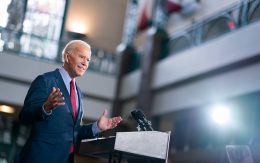It is no secret that Donald Trump’s aggressive domestic and international policies brought the diverse democrats on the same page. His espousal of anti-internationalist doctrine was met with harsh criticism by both wings of the Democratic Party – centrists and progressives alike. Similarly, his federal tax cuts that have exacerbated structural inequality in the US also elicited staunch condemnation from leading democrats. However, now when the Biden-Harris duo has bagged a decisive victory in the November elections, will this alliance between the centrists and progressives sustain or will the party divide into two ideological blocs?
The answer to this crucial question lies in the recent chain of events in American politics. Soon after Joe Biden was declared winner in the presidential race, recently re-elected congresswoman from the democratic ticket, Alexandria-Ocasio Cortez, underlined in an interview that the division between the centre and the progressive wing of the party still exists. Similarly, she also stressed that the relationship between Mr. Biden and the progressive wing will hinge on the latter’s actions as the president.
However, now the prospect of cooperation on several domestic and external security issues already looks slim. In the announcement of a transition team, the president-elect not only sidelined the progressives but also inducted a number of controversial figures in the new administration.
On the foreign policy front, Biden has nominated Antony Bliken as the next Secretary of State. Blinken is an Obama’s era veteran who supports cold-war style diplomacy of ‘isolating’ and ‘containing’ regional influence of US’s rival states like China and Russia. Similarly, the nomination of Avril Haine as the Director of Intelligence is equally concerning. As the former deputy director of CIA, she was among the key architects of the notorious drone policy that indiscriminately killed people in the Middle-East and elsewhere, eliciting an outcry against the human rights violation. This lets one assume that Biden will most likely continue Obama’s ambitious interventionist legacy, which often draws condemnation from the American left.
Similarly, it is most likely that under such circumstances the DC foreign policy establishment will further exacerbate the mistrust of America, especially in China. Progressive Democrats have long favoured strategic diplomatic dialogues with Beijing to avoid the possibility of an armed conflict, especially in a volatile region like the South China Sea in the pacific, which can unleash a colossal global catastrophe. However, the recent so-called bipartisan consensus against the Asian power has undermined such position, and Biden will most likely continue diplomatic confrontation, even if he disfavors a direct military face-off.
On the domestic front, things are not very different. Progressives like Bernie Sanders, Elizabeth Warren, and Ms Ocasio-Cortez advocate strong tax reforms to curb the expansion of big corporations and to redistribute America’s wealth – especially after the Covid-19 pandemic which has rendered more than 33 million people unemployed.
However, Biden’s new team does not seem too ambitious. Biden will most likely undo Trump’s economic (mis)directions, including his $1.5 Trillion tax cut, but it is highly unlikely that he will go full overhaul against the corporate sector. Biden’s pick for the Office of Management and Budget, Neera Tanden, who heads a corporate-financed think-tank, further corroborates his centrist tendencies. Similarly, according to the Wall Street Journal, around 40 members of Biden’s transition team are serving or former corporate lobbyists.
Moreover, the new administration is also set to roll out a bipartisan stimulus package of $908 billion to counter the pandemic induced economic downturn after Biden signalled his support for the Manchin-Romney plan. Yet, Sanders, the front face of the progressive bloc, in a series of tweets announced to oppose it on the pretext that it provides legal immunity to the corporation and does less to ameliorate the condition of the American working class, reflecting a rift among the democrats over the crucial economic issue.
Lastly, the progressive Democrats also expected Biden to form a strong team to tackle climate change. But Biden’s selection of former State Secretary, John Kerry, as climate envoy has largely busted their expectations. Even though John Kerry is among the masterminds behind the Paris Agreement, he is a strong advocate of “carbon-pricing” to fight climate change – an option not deemed favourable by the progressives.
Nevertheless, America will likely see a major change after four years of fanatic “Trumpism”. But it is much likely that such change will largely be headed by the protagonists of the DC establishment who dominate the Democratic Party’s decision-making circles. However, with the recent rise in mainstream support for young-progressive democrats within its ranks, a rift within the Democratic Party is clearly visible. And if Biden intentionally chooses to ignore the demands of the rising progressive voices, the resulting end to the forced marriage between the centrists and progressive can cost him a major blow in the 2024 elections.
Sources
CNN (2020): Here’s who could serve in top roles in the Biden administration, https://edition.cnn.com/2020/11/10/politics/biden-harris-administration/index.html, accessed 15.12.2020
CNN (2020): Progressives are picking their fights with Biden. Neera Tanden’s nomination likely won’t be one, https://edition.cnn.com/2020/12/03/politics/neera-tanden-bernie-sanders-progressives/index.html, accessed 15.12.2020
Forbes (2020): Trump And McConnell Will ‘Come On Board’ With $908 Billion Stimulus Plan, Sen. Cassidy Says, https://www.forbes.com/sites/sarahhansen/2020/12/06/trump-and-mcconnell-will-come-on-board-with-908-billion-stimulus-plan-sen-cassidy-says/?sh=15395c7b7df9, accessed 15.12.2020
The New York Times (2020): Alexandria Ocasio-Cortez on Biden’s Win, House Losses, and What’s Next for the Left, https://www.nytimes.com/2020/11/07/us/politics/aoc-biden-progressives.html, accessed 15.12.2020
The Wall Street Journal (2020): Biden Grants Waivers to Lobbyists to Serve On Transition, https://www.wsj.com/livecoverage/latest-updates-biden-trump-election-2020/card/JoZ9MsykGqwQ8EA40uul, accessed 15.12.2020
The Washington Post (2020): Biden’s transition teams mix centrists and progressives. But keep an eye on this obscure White House office, https://www.washingtonpost.com/politics/2020/11/20/bidens-transition-teams-mix-centrists-progressives-keep-an-eye-this-obscure-white-house-office/, accessed 15.12.2020








Be First to Comment